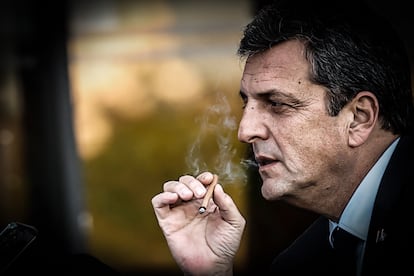Sergio Massa: The Argentine minister turned presidential candidate
The 51-year-old is hoping to win the October 22 elections, but with the economy in toil and voters increasingly suspicious of the political class, achieving such a feat will be difficult


Since he made his political debut as a teenager, Sergio Tomás Massa has wanted to be president of Argentina. Friends and enemies both recognize his persistence. Ambitious and foolhardy, he tried to win the presidency on his own in 2015 and failed. At 51, he is running again, this time as the candidate for the ruling Peronist coalition, Frente de Todos (Everyone’s Front).
On Sunday, for the first time since he took office as Economy Minister 11 months ago, Massa showed up at a public event supported by Argentine President Alberto Fernández and Vice President Cristina Fernández de Kirchner. The act was held to celebrate the Néstor Kirchner gas pipeline, the government’s largest energy infrastructure project. The first section of the pipeline runs 750 kilometers from the Vaca Muerta oilfields in Neuquén to Salliqueló in the heart of Buenos Aires province. It will save the country more than $4 billion a year in gas imports.
“To those who argue that Argentina is a country of frustration, failure, without destiny, without future, where everything is wrong, today is one of those days in which the soul and heart of every Argentine should be proud to be Argentine,” said Massa to applause.
The inauguration comes as Argentina prepares for the October 22 presidential election. The ruling Peronist coalition has chosen Massa as its candidate. But winning the vote will not be easy: the economy is hanging on by a thread, and voters have become increasingly wary of the political class — which Massa has been a part of since he was 17 years old.
Massa was born in 1972 in a middle-class home in the suburbs of Buenos Aires, the extensive belt of municipalities that surrounds the Argentine capital, where around 11 million people live — nearly 25% of the country’s population. The son of a construction businessman and a housewife, Massa entered politics in the 1990s as part of the right-wing group Unión de Centro Democrático (Union of the Democratic Center), which supported Peronist parties during the presidency of Carlos Menem. Massa went one step further: he jumped over the fence and joined their ranks.
Massa was quickly rewarded for the move: in 1999 he was elected provincial deputy of Buenos Aires Province Chamber of Deputies and less than three years later he was appointed the head of Argentina’s Social Security administration ANSES. He took office in the midst of a financial crisis and achieved an unexpected success: a rise in minimum pensions, which had been frozen for nine years.
Massa was Cristina Kirchner’s chief of staff between 2008 and 2009, but later broke with the vice president. He said Kirchner should be “put in prison” for corruption, and backed lifting her parliamentary privileges for that purpose. It has been difficult for Kirchner grassroots supporters to accept his return to the party. Nor have they forgotten his brief links to former far-right president Mauricio Macri, his longstanding friendship with opposition candidate Horacio Rodríguez Larreta or his ties to the United States. But as Fernández has become bogged down in crises, Massa has become more and more prominent.
Massa has been calculating the right moment to make his move. He won his first victory when he was appointed economy minister last August. At the time, the peso was in free-fall and inflation was at record highs. A year later, the peso is only just surviving and prices are still out of control, but Massa argues that the situation would have been much worse without him: that he saved the country from bankruptcy.
Massa’s numerous friends in the media, business and financial elite have helped spread this story. Massa is doing his best to show a downward trend in inflation —which was 7.8% in May and 114% year-on-year —, postponing the official devaluation of the peso and negotiating with the International Monetary Fund to settle part of its debt in Chinese yuan. But each economic setback takes a toll on the Argentine people, and makes it more difficult for him to play the role of superhero.
Minister by day, presidential candidate by night, the hyperactive Massa has three and a half months — an eternity in Argentina — to try to win back the electorate disenchanted with Fernández. Surveys show that this is a daunting task: opposition parties such as Juntos por Cambio (Together for Change) and the far-right group led by the economist Javier Milei are leading in voter intention polls.
“We made the impossible possible,” said Massa at the pipeline opening on Sunday. “Everyone told us that it was impossible. Thanks to the companies and the thousands of workers, who worked in very harsh conditions, at night, in the cold, in the wind, they showed Argentina what we are capable of.” With hope as his banner, Massa will try to win over voters at the October 22 presidential election.
Sign up for our weekly newsletter to get more English-language news coverage from EL PAÍS USA Edition
Tu suscripción se está usando en otro dispositivo
¿Quieres añadir otro usuario a tu suscripción?
Si continúas leyendo en este dispositivo, no se podrá leer en el otro.
FlechaTu suscripción se está usando en otro dispositivo y solo puedes acceder a EL PAÍS desde un dispositivo a la vez.
Si quieres compartir tu cuenta, cambia tu suscripción a la modalidad Premium, así podrás añadir otro usuario. Cada uno accederá con su propia cuenta de email, lo que os permitirá personalizar vuestra experiencia en EL PAÍS.
¿Tienes una suscripción de empresa? Accede aquí para contratar más cuentas.
En el caso de no saber quién está usando tu cuenta, te recomendamos cambiar tu contraseña aquí.
Si decides continuar compartiendo tu cuenta, este mensaje se mostrará en tu dispositivo y en el de la otra persona que está usando tu cuenta de forma indefinida, afectando a tu experiencia de lectura. Puedes consultar aquí los términos y condiciones de la suscripción digital.








































